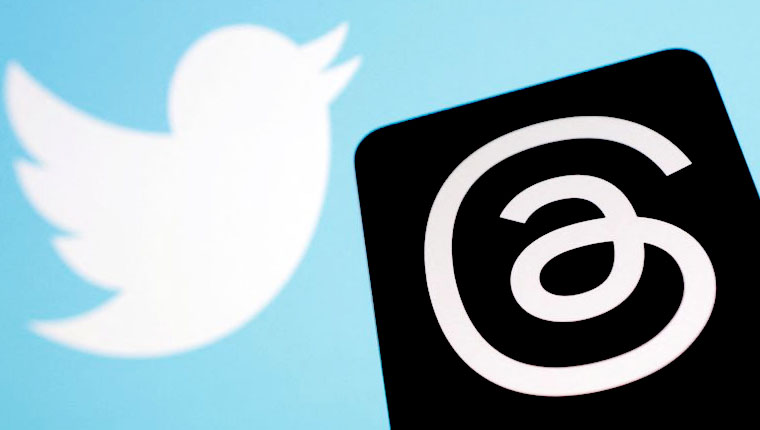In a bold move to challenge Twitter’s dominance, Meta Platforms has launched Threads, a new app that has quickly gained a massive following. Seizing the opportunity presented by Twitter’s recent tumultuous decisions under owner Elon Musk, Meta is capitalizing on its rival’s weakened state.
Since its launch, Threads has already attracted millions of users, including notable celebrities like Kim Kardashian and Jennifer Lopez, as well as influential politicians like Democratic U.S. Representative Alexandria Ocasio-Cortez.
“Let’s do this. Welcome to Threads,” enthusiastically wrote Meta CEO Mark Zuckerberg in his inaugural post on the app, accompanied by a fire emoji. Within just seven hours, the app garnered an impressive 10 million sign-ups.
Zuckerberg didn’t miss the chance to throw a playful jab at Musk and Twitter. Taking to Twitter, he posted a well-known meme featuring Spiderman facing off against Spiderman, symbolizing the rivalry between the two services.
Industry analysts believe that Threads’ integration with Instagram could provide it with a substantial user base and a robust advertising mechanism. This could divert ad dollars away from Twitter, especially when its new CEO is struggling to revive the platform’s business.
Although Threads was launched as a standalone app, users can conveniently log in using their Instagram credentials and follow the same accounts. This integration makes it an effortless addition to the routines of Instagram’s more than 2 billion monthly active users.
“Investors can’t help but be excited about the prospect of Meta truly becoming a ‘Twitter-Killer,'” commented Danni Hewson, head of financial analysis at investment firm AJ Bell.
Many see the launch of Threads as an opportunity to create a less toxic alternative to Twitter, aiming for a platform that exudes positive vibes, strong community engagement, excellent humor, and less harassment. Representative Ocasio-Cortez expressed this sentiment in her post, hoping for a better online experience.
Similar to Twitter, Threads features short text posts that users can like, repost, and reply to. However, it does not include direct messaging capabilities. According to a Meta blog post, posts on Threads can be up to 500 characters long and can include links, photos, and videos up to five minutes in length.
The app is readily available in over 100 countries on both Apple’s App Store and Google’s Play Store, catering to a wide audience. Meta’s stock demonstrated resilience and closed with a 3% increase on the day of Threads’ launch, surpassing gains made by rival tech firms.
TWITTER’S DEFENSIVE STANCE
Threads enters the scene at a time when Twitter finds itself on the back foot, with Meta taking direct aim at the struggling social media giant.
Elon Musk acquired Twitter for a staggering $44 billion in October of last year. However, the platform’s value has since plummeted due to substantial staff cuts and controversies surrounding content moderation. These issues have resulted in alienating both users and advertisers. Twitter’s latest measure includes limiting the number of tweets users can read per day.
Recognizing the challenges associated with large-scale public social media platforms, Zuckerberg expressed his belief in the necessity of a conversations app with over one billion users. He noted that Twitter had the opportunity to achieve this but fell short. With the launch of Threads, he hopes to fill this void.
The integration of Threads with Instagram brings several privacy considerations into focus. Instagram users who sign up for Threads automatically have a badge displayed on their profile, though they have the option to hide it. Additionally, users can choose different privacy settings for each app,
allowing them to customize their experience based on their preferences.
Prominent brands such as Billboard, HBO, NPR, and Netflix wasted no time in setting up accounts on Threads immediately after its launch. Notably, the app appeared to be free of advertisements, according to a review conducted by Reuters.
To ensure the success of Threads, Meta has been actively reaching out to social media influencers, aiming to attract them to the new platform. Influential CEO Ryan Detert stated that Meta has been encouraging influencers to post at least twice a day on Threads. By leveraging the influence of these content creators, Meta hopes to establish a thriving user base and vibrant community.
Furthermore, Threads enters the market at a time when other would-be Twitter competitors have failed to seize the opportunity presented by the platform’s struggles. While various alternatives like Mastodon, Post, Truth Social, and T2 have attempted to lure Twitter users away, they remain relatively small in scale.
Bluesky, a new service backed by Twitter co-founder Jack Dorsey, launched its invite-only beta version in February. Initially, there was significant demand for access codes. As of April, Bluesky reported having 50,000 users. Dorsey has also supported another platform called Nostr.
It’s worth noting that Meta has faced setbacks in the past when attempting to launch standalone copycat apps. One notable example is Lasso, which aimed to compete with the popular short-video app TikTok. However, Meta later integrated a similar short-video feature, Reels, directly into Instagram. More recently, the company has scaled back its efforts in developing experimental apps.
Responding to a user’s prediction of Twitter’s demise shortly after the launch of Threads, Zuckerberg urged patience, reminding everyone that this is just the beginning of the competition. He sees the current stage as merely the opening moments of the first round, hinting at the long-term battle between the two platforms.
As Meta’s Threads gains traction and establishes its presence, it poses a significant challenge to Twitter’s dominance in the social media landscape. With its integration with Instagram, privacy considerations, and engagement with influencers, Threads has the potential to carve out its own space and attract users seeking a fresh, less toxic online experience. The competition between Meta and Twitter is just getting started, and the outcome remains uncertain.

